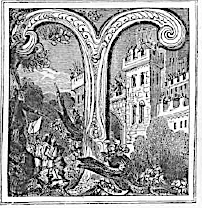Letitia Elizabeth Landon (L. E. L.) in Fisher's Drawing Room Scrap Book, 1833/Lord and Lady Derby
3

JAMES STANLEY, 7th EARL OF DERBY,
|
LORD AND LADY DERBY.
 HE times are peaceful, and we know
HE times are peaceful, and we know
No unsheathed sword, no bended bow;
No more upon the quiet night
Flashes the beacon’s sudden light,
No more the vassals in the hall
Start at the trumpet’s fiery call;
And undisturbed the ivy wreath
Hangs o'er the battlements beneath.
Years have gone by since English hand
Spilt English blood on English land.
—We see the armed warriors ride,
But only in their plumed pride,
The actual agonies of war,
Thank God, have been from us afar.
We have not seen the silvery flood
Run crimson with our kindred’s blood;
We have not seen the stranger’s tread
Profane the church where slept our dead;
Nor watched the red and kindled air,
And known our home was blazing there.
Our soldiers to a foreign soil
Kept the wild warfare’s blood and toil,
And news of some proud victory
Was all that ever crost the sea.
—But England has known other days,
Has seen her own home dwellings blaze,
Has heard the thundering volleys come,
And trembled at the beaten drum.
Father and son stood side by side,
Yet not as by their blood allied,
Each stern in his adopted cause,
For feudal or fanatic laws.
—Aye led by some high-sounding name,
Man has been ever but the same,
Fighting for altar, or for throne,
For any rights, except his own.
—'Tis in such troubled times, the few
Find they have powers they never knew;
And yonder highborn dame, who stands
With flowerets in her graceful hands,
With broidered robe, and ringlet fair,
Scarce breathed on by the fragrant air,
Dreamed not that she should stand alone
When pikes were raised, and trumpets blown,
And gathered foes around the wall,
And she sole chief in Lathom Hall.
But ere she put aside her fears,
And woman’s weakness—woman's tears,
How many a long; and anxious hour
She must have passed in secret bower,
Till she stept forth, the calm and proud
To meet and animate the crowd.
—Ah, woman’s is another lot,
Where ruder cares and strife come not;
Her hand upon the silvery lute,
Winning sweet answer to its suit,
Or bidding mimic flowers arise
Mid the embroidery's rainbow dyes;
Her step the music of the hearth,
Soul of its sorrow or its mirth,
Who hath of time its dearest part,
The one charmed circle of the heart.
Evil must be the cause and day,
That takes her from such life away;
Then, Lady, while we honour thee,
And to thy faith and chivalry
Give high and honourable fame,
We wish no rival to thy name.
"The story of this illustrious Lady," remarks Mr. Lodge, "exhibits a character so abounding in sagacity, prudence, loyalty, grandeur of spirit, and active heroism, as to beguile us for a moment into a feeling of regret, that the social policy of all climates and ages should have agreed to restrict the amiable sex to the power of pleasing, and to repress those energies which, in spite of its regulations, occasionally burst forth, and always with a degree of splendour, which is rarely found to adorn even the finest of masculine sentiments or actions.
During the absence of the Earl of Derby in the Isle of Man, Lathom was invested by the parliamentary forces in 1644. Sir Thomas Fairfax offered them honourable terms of surrender—the terms, however, to be adjusted by himself. These the Countess indignantly rejected, and forthwith prepared for every extremity, saying, "That though a woman, and a stranger, divorced from her friends, and robbed of her estate, she was ready to receive their utmost vyolence, trusting in God both for protection and deliverance." Ill supplied with provisions, she yet continued to hold out, though the walls were nearly battered to pieces about her ears. On one occasion, a ball entered into her ladyship’s chamber, where she and the children were at breakfast. With as little emotion as Charles the Twelfth on a like occasion, she merely remarked, that "since they were likely to have disagreeable intruders, she must even seek a new lodging, but I will keep my house while a building is left above my head." A MS. journal of the time quaintly states, "The litle ladyes had stomack to digest cannon." At length her constancy was rewarded; for on the approach of Prince Rupert, after his victory at Newark, the siege was raised, and the enemy retreated upon Bolton. Twenty-two of the colours, which three days before had been displayed against the castle, were presented to her from his Highness, by Sir Richard Crane, as a memorial of her deliverance, and "a happy remembrance of God's mercy and goodness to her and her family."Vide Roby's Traditions of Lancashire.